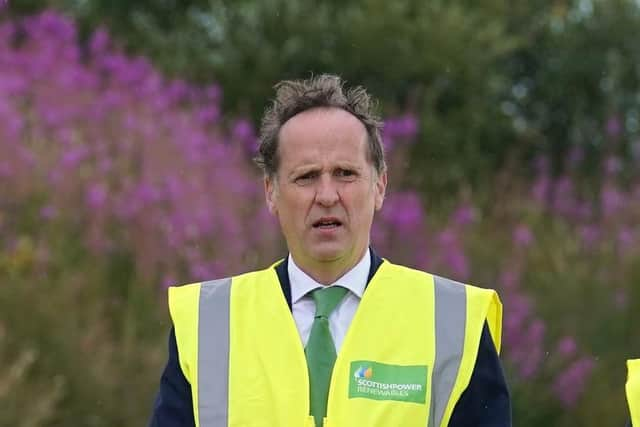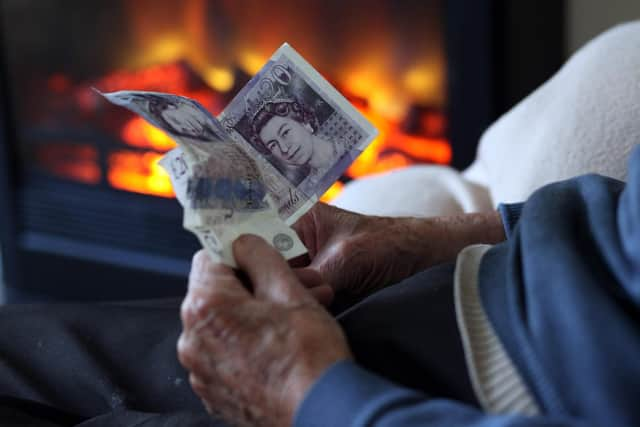Cost of living crisis needs pandemic-level response - energy boss
Keith Anderson said that people are feeling “genuine fear” as energy bills rise “off the charts and out of reach”. And he called on the Government to double the support packages that it put into place in May this year – which promised £400 for all households and up to £1,200 for the most vulnerable.
“People’s concern about how they’re going to make ends meet when the price cap goes up at the start of October is palpable, and turning to genuine fear,” Mr Anderson said.
Advertisement
Hide AdAdvertisement
Hide AdHe warned that the “tough conditions for UK households are going to get much, much worse before they get better – and are going to endure for longer than any of us could have expected”.


Labour is today set to call for the energy price cap to be frozen at its current level of £1,971, blocking an expected increase to £3,300 in October.
It comes days after energy bosses – including Mr Anderson – met with Prime Minister Boris Johnson and other Cabinet members to discuss the crisis.
The meeting appeared unfruitful, with the Government saying it would not make any major decisions until the new prime minister is installed early next month.
This week three “peaceful, dignified” groups “spanning political divides” have protested at the ScottishPower offices, Mr Anderson said: “All with one message. People urgently need help to get through this.”


Bills were this week forecast to rise to close to £5,300 for the average household per year in April. The rises will eat up support announced in May, when experts thought that bills would peak at £2,800.
Mr Anderson said that households will need the same again to get through what experts are currently forecasting.
“We should look to the lessons of the pandemic to offer support on the size and scale needed to see households through the worst of the pain this winter and over the course of the next two years,” he said.
Advertisement
Hide AdAdvertisement
Hide AdMr Anderson added: “Alongside other support measures, the Government could set up a deficit fund to cover the difference between what people pay and how much it costs to supply their homes with gas and electricity.
“The fund could be underwritten by the Government, or a willing financial institution, and repaid over a 10 to 15-year period to smoothe out the costs.
“We can use the time to speed up investment in cheap green energy, to cut energy use and emissions by more ambitious energy efficiency programmes, and to make progress in delinking electricity prices from gas, to better reflect the use of cheaper green energy in our mix,” he added.
“Britain has rightly stood up for Ukraine, standing united with those in need and we must continue to do. But we must also support people here during these unprecedented times.”
Labour leader Keir Starmer will make the price cap call today, putting further pressure on the two Tory leadership contenders.
A think-tank has warned households on low incomes will have to reduce their spending power by three times as much as high income households in order to afford their energy bills this winter.
Sir Keir will call for the price-cap freeze when he sets out details of his party’s plans, including how they will pay for the measure.
Specifics of the measure were not available, though Sir Keir wrote elsewhere that the party aimed to end energy “injustice”.
Advertisement
Hide AdAdvertisement
Hide Ad“We would end the injustice that sees people on prepayment meters paying over the odds for their energy,” he said.
“And we will set out how we would help people directly this winter in the coming days.”
It comes after Sir Keir on Friday said it is “nonsense” to claim his party has not been leading on the cost-of-living crisis.
Last week the party announced it wanted to put a stop to “outrageous” premiums that energy prepayment meter customers face.
Shadow chancellor Rachel Reeves said Labour would end the “unjustifiable” practice that can result in people with energy prepayment meters being charged more than those who pay by direct debit.
Meanwhile, Rishi Sunak set out plans to make Britain “energy secure” – including boosting North Sea gas production – as he seeks to make up ground in the Tory leadership race.
The former chancellor said he would legislate to make the UK “energy independent” by 2045 at the latest as he vowed to ensure there is no repeat of the looming winter crisis.
Mr Sunak confirmed that if he becomes prime minister on September 5, he would put in place immediate support for households – particularly the most vulnerable – faced with soaring energy bills.
Advertisement
Hide AdAdvertisement
Hide AdAt the same time he pledged urgent action to drive up domestic energy supply with the creation of a new energy security task force and deregulation in the North Sea to allow gas production to increase over the winter.
Regulations governing offshore wind, rooftop solar and nuclear would be overhauled to scale up supply, while fracking for shale gas would be allowed where there is local consent.
Mr Sunak said he would also take steps to radically reduce energy waste, with low cost measures to insulate millions of homes.
In the longer term, he promised to reform the energy market – which was no longer “fit for purpose” – to cut bills, with the establishment of a new dedicated energy department to lead the change.
His intervention came after analysts warned the average annual household energy bill could top £5,000 by next spring as the war in Ukraine continues to drive up the cost of oil and gas.
“The first rule of any crisis is to acknowledge that you are facing one. We are facing an energy crisis and I have a plan to both get us through it and make sure this is a one winter crunch,” Mr Sunak said.
“I will lead a national effort to increase our domestic energy supply and cut our energy waste. I will also make sure our country is never put into this position again.
“I will leave no stone unturned to secure British energy sovereignty. We cannot rely on imported energy so I will legislate for the UK to be entirely energy independent by 2045 to accelerate investment.
Advertisement
Hide AdAdvertisement
Hide Ad“My plan will get us through this winter crisis and provide energy security for Britain.”
Mr Sunak has acknowledged that he remains the underdog in the contest to succeed Boris Johnson, with polling suggesting a strong lead for Foreign Secretary Liz Truss among Tory party members who will decide the outcome.
Mr Sunak’s plans to boost North Sea gas production and to allow fracking were condemned by climate change campaigners.
Greenpeace UK’s policy director, Doug Parr, said: “Has Rishi Sunak just been sat under an air conditioning unit all day?
“Despite the searing temperatures and drought declared by his own Government, his plans for energy independence have completely ignored the fact that we’re also grappling with a climate crisis.
“Someone should also remind him that his Government has already made a legally binding commitment to cut emissions to zero by 2050.”
Comments
Want to join the conversation? Please or to comment on this article.